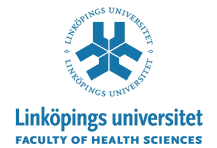 |
Visa svensk kursplan |
|
COURSE CATEGORY Single subject course MAIN FIELD OF STUDY SUBJECT AREA |
COURSE CODE | 8FA010 |
Learning outcomes
By the end of the course the students will be able to:
-Find and follow relevant instructions to utilize internet-based tools and computer programs to identify, compare and analyse biological molecules
-Interpret and evaluate results from databank searches in a biomedically relevant context
-Compare and evaluate bioinformatics tools for given datasets
-Independently identify and select relevant bioinformatics tools in order to illuminate different aspects of a given task and perform relevant analyses
-Compile and communicate conclusions regarding the interpretation of the results as well as comparison of the results to published information from biological experiments
-Performing searches in biological databanks
-Identification and comparison of sequence data of nucleotide and amino acid sequences
-Patterns in amino acid sequences
-Secondary and tertiary structures of proteins
-Metabolic pathways
-Phylogenetic reconstructions through alignments of sequences between different species
The educational method used is problem-based learning (PBL). PBL emphasises the students development of free, self-supporting, life-long learning ability as an instrument for critical inquiry. The students own queries and the problems formulated form the basis of PBL. Important is also the student´s ability to take responsibility for his/her own learning, and to seek and evaluate information and knowledge as well as to develop co-operative skills and a flexible attitude to different views and ideas.
Students who have failed the course or part of the course twice are entitled to request another examiner for the following examination occasion.
Extent of re-examination
The extent of a re-examination shall be similar to the regular examination.
Entries for examinations
Rules for entries for examinations are given in the course plans. In addition the "Regulations regarding examinations and examiners" laid down by decision of Linköping University (Dnr LiU 1109/00-40) apply.
Applicants with a degree from a non-Swedish university must enclose an official examination certificate of at least three years of full-time studies in subjects with relevance for Life Science, such as biology, chemistry, medicine or similar.
Documented knowledge of English equivalent to ”Engelska B”; i.e. English as native language or an internationally recognized test, e.g. TOEFL (miminum scores: Paperbased 550 + TWE-score 4.0, computerbased 213 and internetbased 79), IELTS, academic (minimum score: Overall band 6.0 and no band under 5.0), or equivalent.
Planning and implementation of the course shall be carried out from the wording in this course plan. The evaluation of the course should therefore consider the question how well the course agrees with the course plan. Oral and written evaluation will be arranged at the end of the course.
Electronic evaluation of the course will also take place in accordance with Linköping University´s regulations (Dnr LiU 780/06-04).
Certificate
At the student´s request, a course certificate may be issued by the director of studies for courses or, according ro delegation, by the head of the department/director of programme studies.
Additional Information
The course is given in such a way that both men´s and women´s experiences and knowledge are foregrounded and developed.
If the course is withdrawn, or is subject to major changes, examinations according to this course plan are normally offered on a total of three occations within one year, one of them in close connection with the first examination.
|
||||||||||||||||||||||||||||||||||||||||||||||||||||||||||||||||||||||||||||||